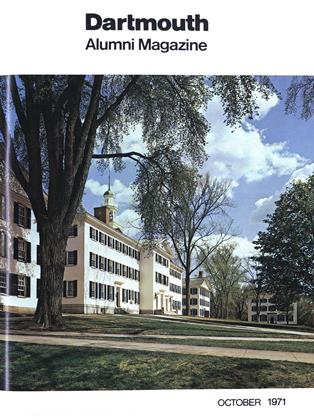By Ralph M. Wardle '31.Lincoln: University of Nebraska Press,1971. 530 pp. $15.
"Cankered cockney, pimpled coxcomb, rabid caitiff, the dirty dandy of literature, an ulcer rather than a man, and an unnatural liar who ought to be immersed in the Jakes." In the first part of the nineteenth century, when much journalistic prose would have disgraced even London's lowest pothouse, a writer had to work hard to merit such criticism. William Hazlitt deserved it all.
Son of a brilliant but unsuccessful Unitarian minister, early in his life Hazlitt rebelled against both his father's faith and failure. After a brief fling as a philosopher and a longer stint as a painter, he turned to journalism, becoming one of the most prolific writers of his age. When he died in 1830, although he had published over four million words, he considered himself a failure. Time, however, has reversed his historically premature judgment. Today literary scholars think him the most representative critic of the English romantics. Historians study his writings in order to understand English liberalism. And armchair readers delight in mixing his familiar essays with their tawny port on long winter evenings.
Unfortunately, William Hazlitt the man has been lost in studies of Hazlitt as critic, historian, and essayist—at least until Mr. Wardle's biography. Now at last we have a full picture of Hazlitt. Placing him in his historical background, Mr. Wardle's book is a scholarly study of Hazlitt the man, and Hazlitt, the literary jack of all trades.
The story is not a happy one. Always verging simultaneously on success and failure, Hazlitt literally wrote himself to death, trying to avoid poverty. "Dinners with Duke Humphry" were delayed only by timely articles or by loans from friends. And, unfortunately, the friends were few, for Hazlitt had to make his work biting enough to sell and could not afford bland critical magnanimity. Sooner or later the pressures of the literary marketplace, combining with his own jealousy, led him to write articles attacking his personal acquaintances. Coleridge, who had been one of his earliest patrons, was labelled "a dog in the manger of literature" and "a maudlin, methodistical preacher." Yet despite such backbiting, people were drawn to Hazlitt. Lamb, Keats, Jeffrey, and even Coleridge praised him and his writings.
Hazlitt's tempestuous literary career set the tone for his personal life. Taking his cue from Regency libertinism, Hazlitt's first marriage ended in divorce. His second wife decamped. A baffling mixture of sentimentalist and cad, Hazlitt loved his son so much that he wanted the boy with him all the time, and even took him along when he wandered through London, looking for prostitutes.
Filled with anecdotes, Mr. Wardle's biography is a scholarly mine for those interested in Hazlitt and his age. Focussing on one of the most controversial writers of the period, Mr. Wardle's study brings to life the ruthless world of London journalism in the early nineteenth century.
A Ph.D. from Princeton and a DartmouthAssistant Professor of English, Mr. Pickeringteaches Victorian and Modem AmericanLiterature and gives a seminar on Dickensand Thackeray.
 View Full Issue
View Full Issue
More From This Issue
-
 Feature
FeatureThayer School's Centennial
October 1971 By WILLIAM P. KIMBALL '28 -
 Feature
FeatureOMBUDSMAN
October 1971 By MARY ROSS -
 Feature
FeatureDartmouth Art Show in Boston
October 1971 -
 Feature
FeatureSummer '71: Diligent Diversity
October 1971 -
 Article
ArticleFaculty
October 1971 By ROBERT B. GRAHAM '40 -
 Article
ArticleBig Green Teams
October 1971
SAMUEL F. PICKERING JR.
Books
-
 Books
BooksCHALLENGE AND PERSPECTIVE IN HIGHER EDUCATION.
MAY 1971 By ARTHUR E. JENSEN -
 Books
BooksMIDDLING NESS:
APRIL 1966 By ARTHUR M. WILSON -
 Books
BooksTHE STICKS: A PROFILE OF ESSEX COUNTY, NEW YORK.
JANUARY 1973 By KENNETH PAUL '69 -
 Books
BooksBusiness Life Insurance.
FEBRUARY, 1928 By Norman E. Gilbert -
 Books
BooksDENMARK ON FIFTY DOLLARS
May 1937 By Raymond W. Jones -
 Books
BooksGame Plan
March 1980 By Thomas R. English ’70



